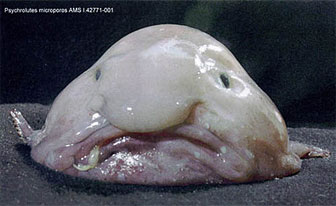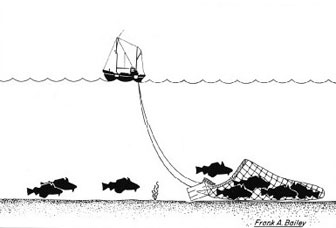Deal to end destructive bottom trawling reached
Deal to end destructive bottom trawling reached
mongabay.com
May 7, 2007
Governments have reached a landmark agreement to end high seas bottom trawling in nearly a quarter of the world’s oceans. Environmentalists say bottom trawling, which destroys reefs and depletes slow-growing fish species, is one of the world’s most destructive fishing practices.
Green group WWF welcomed the news.
“The agreement is a great leap forward for halting the decline in ocean biodiversity and establishing good fisheries management on the high seas,” said Alistair Graham, High Seas Policy Advisor at WWF International.
The new agreement bans “bottom trawling from high seas areas where vulnerable ecosystems are likely or known to occur until an impact assessment is undertaken and until precautionary measures to prevent destruction of marine life, such as vulnerable fish stocks, cold water corals and sponges, are implemented,” stated WWF. The deal initially applies to a large part of South Pacific and Southern Ocean.
  [top] The strange-looking deep sea creature known as the Blobfish (Genus Psychrolutes). Photo courtesy of Greenpeace International. [bottom] trawling diagram courtesy of National Oceanic and Atmospheric Administration (NOAA). |
Beginning September 30, 2007 observers will be required on all high seas bottom trawlers to ensure that regulations are followed. Fishing vessels will be required to cover the cost of observers, a development that reduce the economic viability of trawling.
Trawling is a method of fishing that one or more boats involves towing a cone-shaped net across the sea floor. Conservation groups say the practice depletes marine life and causes ecological damage to reefs and the sea floor.
“Bottom trawling uses weighted nets and huge steel rollers that are dragged across the seafloor, crushing everything in its way, leaving only rubble behind. As coral reefs and sponge areas are damaged, the nursing and feeding grounds for many fish species are being lost, adversely affecting re-growth of fish stocks,” explained WWF in a news release. “Bottom trawlers target slow growing species, such as orange roughy and redfish, that are vulnerable to high fishing pressure as they take decades to reach breeding age.”
New Zealand has the largest bottom trawling fleet in the South Pacific.
WWF notes that the meeting in Chile failed to come to an agreement on overfishing of squid and mackerel in the open seas.
“If mackerel stocks are allowed to be overfished, the ecological, social and economic impacts would be serious, especially for dependent local communities and for species such as tuna and swordfish that feed upon mackerel,” Graham said.